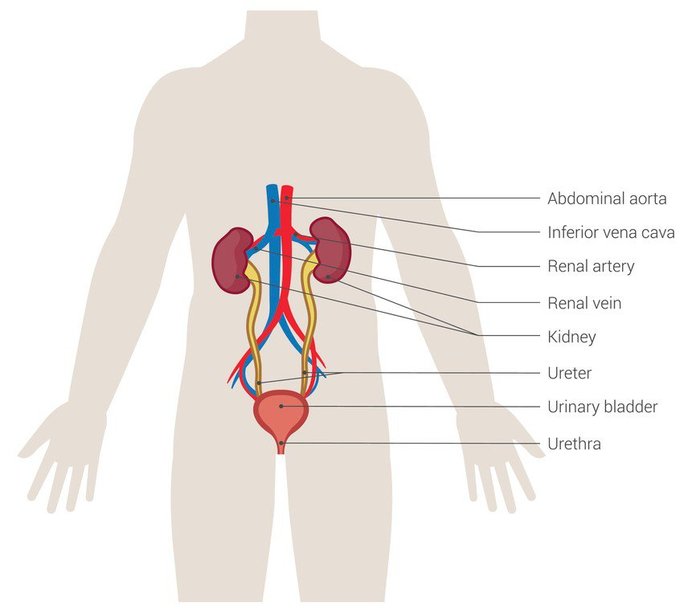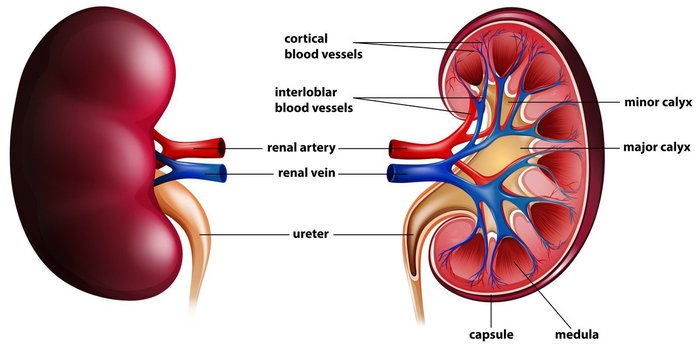Where are your kidneys?
Your kidneys are each about the size of an adult fist and are shaped like beans – think kidney beans, which have their name for a reason. On average they are:
- 12cm long
- 6cm wide
- 3cm thick
- 150g in weight.
Your kidneys sit just below your rib cage, on either side of your spine. They may not be very big but they have some important functions.
Their jobs include:
- filtering your blood to get rid of waste products and extra fluids
- maintaining a healthy balance of water, salts and minerals (such as sodium, potassium and calcium) in your blood
- releasing hormones that regulate blood pressure, make red blood cells and keep your bones healthy.
As you can see in this diagram, the kidneys are part of the urinary tract. This is a term that means all the organs that are involved in making and passing urine (wee).

Let’s look in more detail at how your kidneys do their important work.
How your kidneys filter blood
- Blood flows into them from an artery that comes from your heart, called the renal artery.
- This large blood vessel branches into smaller blood vessels until the blood reaches the kidneys.
- Tiny blood vessels in your kidneys filter the blood.
- The cleaned blood contains lots of substances your body needs, including vitamins, amino acids and hormones. Veins carry this cleaned blood back into your bloodstream.
- Meanwhile, the waste material that’s been filtered out flows through the ureter to your bladder.
- It is stored there until your bladder’s full, and then passes out through your urethra when you wee.
Did you know? Your blood goes through your kidneys many times each day. Working together, your two kidneys filter around 200 litres of fluid (that’s 351 pints!) every 24 hours. Each kidney gets rid of 1-1.5 litres of urine every day.
So how exactly does this delicate process work? Each kidney contains about a million tiny filtering units, called nephrons. Each nephron is made up of a glomerulus and a tubule.
- The glomerulus is a cluster of tiny blood vessels that act as filters. Its thin walls let small molecules, wastes and fluids pass through into the tubule. Larger molecules, like blood cells, are kept in the blood vessels.
- As the filtered fluid passes along the tubule, a blood vessel that runs next to it reabsorbs much of the water, plus minerals and nutrients your body needs. The fluid and waste left in the tubule turn into wee. The tubule sends this to your bladder, via your ureter, for it to be removed.
Here’s the kidney in more detail.

How your kidneys balance water and salts
Your body’s cells are surrounded by fluid. This needs to be made up of a stable mix of salts and water so your cells can work properly. Your kidneys get messages that tell them how much fluid you’ve drunk and then work to maintain the delicate balance of water and salts in your body.
- If you haven’t drunk enough, your body’s fluids get more concentrated and your kidneys excrete a more concentrated urine (you’ll notice your wee looks dark if you haven’t been drinking much).
- If you’ve drunk lots of fluid, your body’s fluids get more diluted. And the kidneys excrete a more dilute urine to get rid of the excess fluid – that pale and watery wee you get when you’ve been drinking a lot.
- If you eat too much salt, you’ll get thirsty and drink more fluid. Your body senses this rise in salt and water and gives your kidneys the message to get rid of the excess.
How your kidneys release hormones
We’re not talking about sex hormones like oestrogen and testosterone. The hormones your kidneys release are ones you may not have heard of, but they’re just as important for your body’s normal functioning.
- Renin keeps blood pressure normal. If blood pressure falls too low, your kidneys release renin to make the small blood vessels narrow, raising blood pressure.
- Erythropoietin (or EPO) works in your bone marrow to boost production of red blood cells, which carry oxygen around your body.
- Vitamin D is changed in your kidneys into an active form that helps your gut absorb calcium, and helps keep your bones and muscles healthy.
What can go wrong with your kidneys?
If your kidneys stop working so well, all the jobs they normally do may be affected. This is called chronic kidney disease, usually shortened to CKD. Chronic kidney disease can cause:
- high blood pressure
- anaemia, a low red blood cell count
- weakened bones because your body doesn’t have enough calcium or vitamin D
- nerve damage
- poor nutritional health
- a raised risk of heart and blood vessel disease, as a result of high blood pressure over time.
AstraZeneca has contributed to the funding of this material as part of a Patient Advocacy Group Partnership between Kidney Care UK and AstraZeneca UK Limited. AstraZeneca has had no editorial input into or control over the content which has been independently owned and created by Kidney Care UK.